Citizen Kane Blu-ray Movie
HomeCitizen Kane Blu-ray Movie 
Second Pressing with corrected BD1 / UPC sticker: 715515270212Criterion | 1941 | 120 min | Not rated | Jan 12, 2022

Movie rating
8.7 | / 10 |
Blu-ray rating
| Users | 0.0 | |
| Reviewer | 4.5 | |
| Overall | 4.5 |
Overview
Citizen Kane (1941)
Chronicling the stormy life of an influential publishing tycoon, when he dies news reporters scramble to discover the meaning of his final utterance.
Starring: Orson Welles, Joseph Cotten, Dorothy Comingore, Agnes Moorehead, Ruth WarrickDirector: Orson Welles
| Drama | Uncertain |
| Period | Uncertain |
| Mystery | Uncertain |
Specifications
Video
Video codec: MPEG-4 AVC
Video resolution: 1080p
Aspect ratio: 1.37:1
Original aspect ratio: 1.37:1
Audio
English: LPCM Mono (48kHz, 24-bit)
Subtitles
English SDH
Discs
Blu-ray Disc
Three-disc set (3 BDs)
Packaging
Slipcover in original pressing
Playback
Region A (locked)
Review
Rating summary
| Movie | 4.5 | |
| Video | 4.5 | |
| Audio | 5.0 | |
| Extras | 5.0 | |
| Overall | 4.5 |
Citizen Kane Blu-ray Movie Review
Reviewed by Dr. Svet Atanasov January 11, 2022Orson Welles' "Citizen Kane" (1941) arrives on Blu-ray courtesy of Criterion. The supplemental features on the disc include numerous archival programs with the director and various cast and crew members; three audio commentaries; archival interview with Martin Scorsese; new program with effects experts Craig Barron and Ben Burtt; vintage trailer for the film; and lot more. In English, with optional English SDH subtitles for the main features. Region-A "locked".
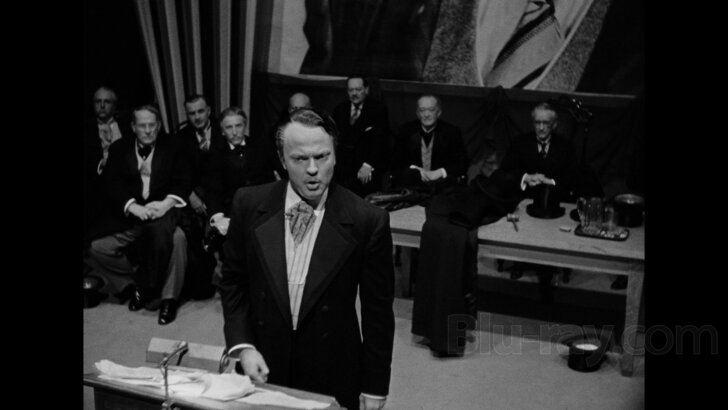
The inevitable winner
Is Orson Welles’ Citizen Kane one of the greatest cinematic masterpieces ever created, or one of the most brilliant cinematic litmus tests ever conceived? Welles’ use of bold, often surprisingly unconventional framing and editing choices confirms that at its core it was undoubtedly an experimental project, but what about the attitude that emerges from it? It is inconsistent, to say the least. It is precisely why it took a long time for influential critics to deconstruct Citizen Kane in a very particular manner and then begin agreeing with each other that it was a mainstream masterpiece, the type of film that could speak with authority to most everyone that gave it a chance.
But what if the popular take on Citizen Kane isn’t the correct take? Have you ever considered such a scenario? What if Welles conceived Citizen Kane to function as a cinematic litmus test that can expose the one-dimensional expectations of influential critics and other people with the ability to shape up a popular opinion? Citizen Kane is full of unorthodox material that can very quickly begin to look like misdirection material if it is seen from the right angle and with the right mindset, and there are plenty of crumbs that lead to precisely such a deconstruction of its narrative. Let’s highlight a couple of these crumbs.
The entire life of the enormously wealthy and powerful publishing tycoon Charles Kane (Welles) is reconstructed via the overlapping recollections of a few individuals that supposedly knew him best. It is these recollections that tell you, the viewer, who the tycoon was and how he treated the people around him. But are they legit? What do you see in Citizen Kane that makes you comfortable trusting these individuals? Well, nothing really. Welles The Director uses them to manipulate you to believe that Welles The Actor is the awful person they are ‘remembering’. In other words, you are told what you should see and are carefully conditioned how to interpret it. (Not coincidentally, this exact practice is still the famous exercise of influential critics and all kinds of different influential media pundits).
There is a point in Citizen Kane where Welles The Director even reveals his entire trick to you, but you have to place it in the right context. It happens shortly after Welles The Actor orders the singing coach to continue working with the woman he loves, Susan Kane (Dorothy Comingore), even though it is already beyond obvious that her voice is awful. At the opera house, the audience can barely endure the new ‘star’ Welles The Actor has created with the power of his media empire. Some people are seen yawning, some are heard booing. After the curtain falls, there is a long moment of silence and the camera intentionally pauses on the face of Welles The Actor as he awaits the audience’s reaction. When the obviously prearranged clapping begins, he enthusiastically begins contributing to it as well. Success. The new 'star' is effectively validated. As it usually happens, eventually the scam is exposed and rejected, but this development is irrelevant because it has been demonstrated just how easy it is to create and manipulate a popular opinion.
Perhaps the most revealing aspect of the dual nature of Citizen Kane is its connection to William Randolph Hurst. It provides the perfect bait the intellectual type needs to begin drawing ‘logical parallels’ and explain the numerous important socio-political themes that are supposedly hidden in it. Of course, from there it is awfully easy to give it a ‘proper’ political identity as well. Don’t fall for it because Welles did not conceive Citizen Kane to be that kind of a political film. It is actually a very cheeky film that reflects quite well the personality of its creator, who just happens to be the greatest prankster to ever step behind a camera.
Citizen Kane Blu-ray Movie, Video Quality 
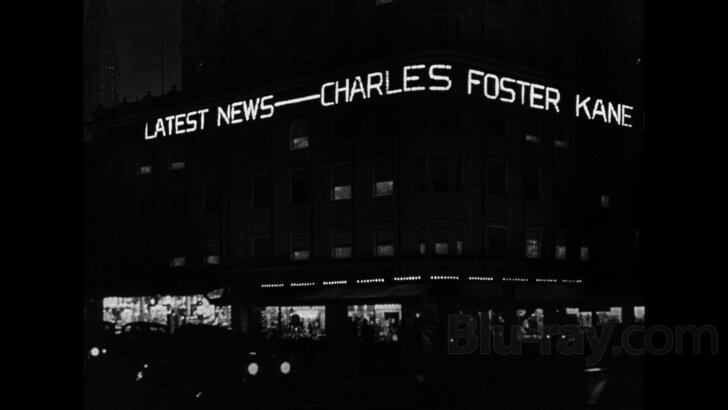
Presented in its original aspect ratio of 1.37:1, encoded with MPEG-4 AVC and granted a 1080p transfer, Citizen Kane arrives on Blu-ray courtesy of Criterion.
The following text appears inside the booklet that is provided with this release:
"Because the 35mm original negative no longer exists, this restoration, undertaken by the Criterion Collection, draws primarily from a 35mm nitrate composite fine-grain master made from the original negative in 1941. Some sequences where the primary element had sustained damage were replaced using a 35mm duplicate negative, struck from the nitrate-grain master itself in 1941. Both film elements were scanned in 16-bit 4K resolution on a Lasergraphics Director film scanner, utilizing high-density scanning and 3-flash HDR (high dynamic range) in order to retrieve the greatest amount of detail from the dense nitrate element. A 35mm print from the collection of the Academy Archive at the Academy of Motion Pictures Arts and Sciences was used as a color-grading reference in this restoration, with additional reference to the 2010 Warner Bros. restoration, whose grading was based on the same reference print. On the 4K Blu-ray disc, the feature is presented in Dolby Vision HDR. On the Blu-ray, it is presented in high-definition SDR (standard dynamic range).
For restoration of the original monaural soundtrack, the bilateral variable-area optical tracks from the both the nitrate fine-grain master and the duplicate negative were transferred at Deluxe Sound Services in Hollywood, using the COSP system. The cleanest surviving sections of the two the elements were selected and compiled into a single track. After eight years, the physical damage to the optical tracks was substantial, manifesting as audible pops, clicks, dropouts, and other distortions. These artifacts were digitally mitigated on a case-by-case basis, with every effort to preserve the character of the original production.
Transfer supervisor: Lee Kline/Criterion Post, New York.
Additional picture element research: Craig Johnson/Warner Bros. Entertainment.
Colorist: Giles Sherwood/Criterion Post.
Audio element supervision: Ryan Hullings/Criterion Post.
Audio restoration: Michael W. Wiese/Criterion Post.
Scanning: Michael Borquez, Chris Gillaspie/Warner Bros. Motion Picture Imaging, Burbank, CA."
Earlier tonight, I was able to view the new Blu-ray release and do some direct comparisons with the previous Blu-ray release from Warner Bros. (I have this release in my library). The technical presentation of the restoration is most definitely not identical. While some of the discrepancies are very clearly introduced by the new encode, it is also very easy to tell that many visuals have a different dynamic range. Sometimes the discrepancy is small and you will most likely need the Warner Bros. release to spot it, but elsewhere it is very easy to recognize it without reference it. On my system, the grayscale produces different ranges of nuances, with visuals on this release typically having stronger grays and blacks and expanded ranges of whites. I think that the perception of depth can be impacted as well, especially on larger screens, but I am unsure precisely how it will be recognized and appreciated by different viewers. Obviously, the same source limitations are retained. My score is 4.75/5.00. (Note: This is a Region-A "locked" Blu-ray release. Therefore, you must have a native Region-A or Region-Free player in order to access its content).
You can read our comments on the native presentation of the 4K restoration here. The 4K Blu-ray release is a combo pack that has 4K Blu-ray and Blu-ray discs.
Citizen Kane Blu-ray Movie, Audio Quality 
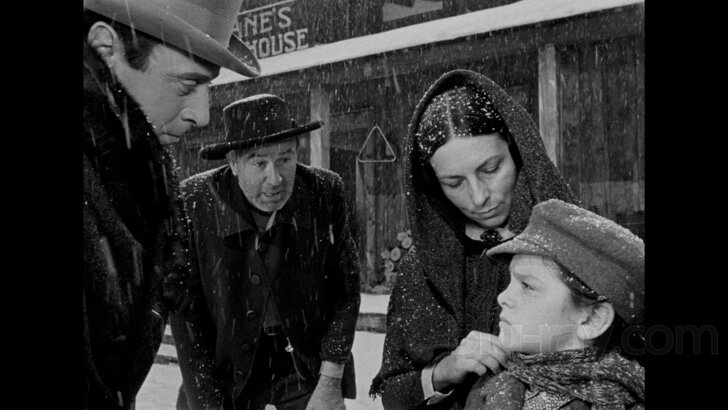
There is only one standard audio track on this Blu-ray release: LPCM 1.0. Optional English SDH subtitles are provided for the main feature.
The native limitations of the original audio are still detectable. However, I think that its overall clarity, sharpness, and stability are very good. I did perform some direct comparisons with the lossless track from Warner Bros' previous Blu-ray release and my impression is that some of the mass scenes can sound a tad better. However, I don't know if the difference will be instantly recognized or appreciated by people that are simply enjoying the 4K presentation.
Citizen Kane Blu-ray Movie, Special Features and Extras 
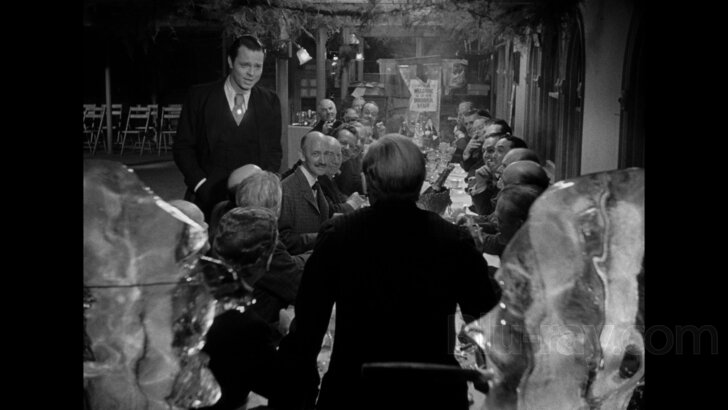
BLU-RAY DISC ONE
- Commentaries - presented here are three audio commentaries, one of which was recorded exclusively for Criterion in 2021.
1. Commentary One - this new audio commentary was recorded by James Naremore, author of The Magic World of Orson Welles, and Jonathan Rosenbaum, author of Discovering Orson Welles. I found the commentary seriously underwhelming because of the attempts of the commentators to infuse it with contemporary political relevance that was completely out of sync with their observations.
2. Commentary Two - this archival commentary was recorded by Peter Bogdanovich in 2002. If you like Citizen Kane, you are likely familiar with it. Bogdanovich has some rather interesting comments about the narrative construction of the film, the manner in which light and shadow are utilized in it, Orson Welles' direction and performance. While occasionally there are rather long gaps between the comments, it is definitely worth listening to in its entirety.
3. Commentary Three - this archival commentary was recorded by the late critic Roger Ebert in 2002. I think that it is the most attractive one, if this is actually possible, and certainly the one that offers the most diverse interpretations of key sections of Citizen Kane.
- The Complete "Citizen Kane" - this archival documentary about the production of Citizen Kane aired on BBC 2 on October 13, 1991. It features clips from interviews with Orson Welles and various people that helped him make the film. In English, not subtitled. (96 min).
- Working on "Kane" - presented here are archival interviews with editor Robert Wise, actor Ruth Warrick, and visual effects operator Linwood Dunn in which the interviewees discuss the production of Citizen Kane. The interviews were conducted for Criterion in 1990 and were included on the label's fiftieth-anniversary LD release of the film. In English, not subtitled. (19 min).
- On Toland - in these archival interviews, cinematographers Allen Daviau, Haskell Wexler, and Vilmos Zsigmond discuss cinematographer Gregg Toland's contribution to Citizen Kane. The interviews were conducted for Criterion in 1990 and were included on the label's fiftieth-anniversary LD release of the film. In English, not subtitled. (16 min).
- Craig Barron and Ben Burtt - in this new program, effects experts Craig Barron and Ben Burtt discuss the unique effects in Citizen Kane. The program was produced for Criterion in 2021. In English, not subtitled. (28 min).
- Robert L. Carringer - presented here is a brand new video essay by film scholar Robert L. Carringer, author of The Making of "Citizen Kane". The essay was produced for Criterion in 2021. In English, not subtitled. (14 min).
- Farran Smith Nehme - in this new program, critic Farran Smith Nehme discusses the connection between Citizen Kane and William Randolph Hurst. The program was produced for Criterion in 2021. In English, not subtitled. (24 min).
- Reframing "Kane" - in this new program, critic Racquel J. Gates discusses Citizen Kane, its status as the "greatest film of all time" some of the challenges that emerge when introducing the film to a younger audience. The program was produced for Criterion in 2021. In English, not subtitled. (16 min).
- Martin Scorsese - in this archival interview, Martin Scorsese discuses some of the unique qualities of Citizen Kane. The interview was conducted for Criterion in 1990 and was included on the label's fiftieth-anniversary LD release of the film. In English, not subtitled. (8 min).
- Stills Photography with Commentary by Roger Ebert - this audiovisual program features Roger Ebert commenting on various photographic stills from the production of Citizen Kane. The program was created in 2002. In English, not subtitled. (11 min).
- The Opening: The World Premiere of "Citizen Kane" - a brief newsreel footage from the premiere of Citizen Kane at the Palace Theatre in New York City on May 1, 1941. In English, not subtitled. (2 min).
- Trailer - a vintage trailer for Citizen Kane. In English, not subtitled. (4 min).
- My Guest is Orson Welles - this brand new program combines segments from Orson Welles' 1970 and '80s television appearances that sum up his image and career. In his later years, Welles financed his filmmaking in part via these paid appearances, up to and including the October 10, 1985, episode of The Merv Griffin Show - recorded mere hours before Welles died. The program was produced in 2021. In English, not subtitled. (43 min).
- Joseph Cotten - presented here are two archival interviews with Joseph Cotten in which he discusses his relationship with Orson Welles.
1. Interview One (1966) - conducted for Granada Television in the UK. In English, not subtitled. (16 min).
2. Interview Two (1975) - the actor's speech at the AFI Life Achievement Award event honoring Orson Welles. In English, not subtitled. (3 min).
- Knowing Welles - in this collection of archival interviews, filmmakers Peter Bogdanovich, Henry Jaglom, Frank Marshall, and Martin Ritt, and cinematographer Gary Graver discuss Orson Welles' personality and working methods and explain what they learned from him over the years. The interviews were conducted for Criterion in 1990 and were included on the label's fiftieth-anniversary LD release of the film. In English, not subtitled. (23 min).
- William Alland - in this archival interview, actor William Alland discusses his work with Orson Welles in theater, radio, and on Citizen Kane. The interview was conducted by director John McCarty in 1996. In English, not subtitled. (21 min).
- Mercury Theatre -
1. The Southbank Show (1988). In English, not subtitled. (51 min).
2. The Merv Griffin Show (1979). In English, not subtitled. (19 min).
3. Dracula (1938). In English, not subtitled. (54 min).
4. Heart of Darkness (1938). In English, not subtitled. (36 min).
5. His Honor, The Mayor (1941). In English, not subtitled. (29 min).
- Orson Welles: On the Nose - this archival program was created by David Cairns and Randall William Cook in 2017. It explores Orson Welles' fascination with altering the shape of his nose while playing various characters. In English, not subtitled. (9 min).
- The Hearts of Age (1934) - this silent production represents Orson Welles' first attempt at filmmaking, at the age of nineteen, while attending the Todd School for Boys in Woodstock, Illinois. (9 min).
- Booklet - 44-page illustrated booklet featuring critic Bilge Ebiri's essay "The Once and Future Kane" as well as technical credits.
Citizen Kane Blu-ray Movie, Overall Score and Recommendation 
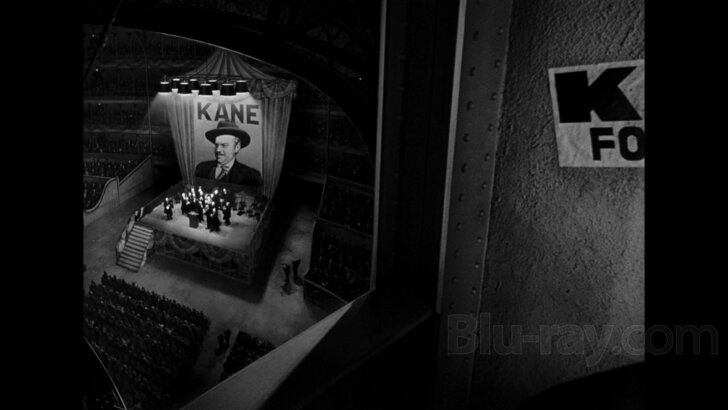
There are a lot of very interesting takes on Orson Welles' Citizen Kane that supposedly explain why it is the greatest film ever made. There are probably bits of the truth in all of them, though I personally do not believe that there is one film that is better than all the other films that were made over the years. So, what is the truth about Citizen Kane? Well, I consider Welles the most brilliant prankster to ever step behind a camera, and the more I revisit Citizen Kane, the more convinced I become that it pokes fun at the people that allowed it to exist as well as the people that were supposed to critique it and determine its public fate. This is the only take on the film that makes perfect sense to me. VERY HIGHLY RECOMMENDED.
*We received a new Blu-ray disc from a Second Pressing that has the technical issue from the First Pressing corrected. The issue was present on the Blu-ray copy that was included in the 4K Blu-ray release as well. If you would like to receive a Second Pressing disc, please follow the instructions provided by the Criterion Collection here.
Other editions
Citizen Kane: Other Editions

Citizen Kane
Ultimate Collector's Edition
1941

Citizen Kane
Ultimate Collector's Edition | The Magnificent Ambersons DVD
1941

Citizen Kane
70th Anniversary Edition
1941

Citizen Kane
75th Anniversary Edition
1941

Citizen Kane 4K
First Pressing with defective BD1 / UPC: 715515266116
1941

Citizen Kane
First Pressing with defective BD1 / UPC: 715515266215
1941

Citizen Kane 4K
Second Pressing with corrected BD1 / UPC sticker: 715515270113
1941
Similar titles
Similar titles you might also like

Once Upon a Time in America
Extended Director's Cut
1984

All the King's Men
2006

There Will Be Blood
2007

Nixon
Election Year Edition
1995

The Ides of March
2011

Ace in the Hole
1951

The Irishman
2019

Submission
2017

Raging Bull 4K
1980

A Face in the Crowd
1957

Pasolini
2014

The Florida Project
2017

Boogie Nights
1997

Sweet Smell of Success
1957

C'mon C'mon
2021

The Iron Lady
2011

The Last Emperor 4K
Theatrical (4K/BD) and Television (BD) Versions
1987

Blonde Venus
1932

City of God
Cidade de Deus
2002

Babylon 4K
2022